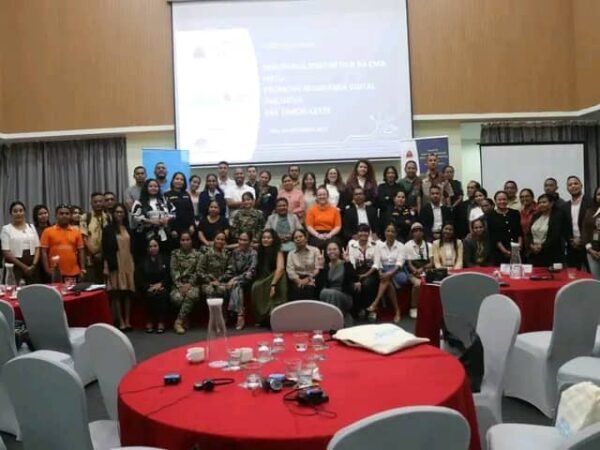Dili, October 2, 2025 (Média Democracia) – The Secretary of State for Equality (S.E.I), through the National Directorate for Public Relations and Media (DNRPM-SEI), officially opened the Panel Dialogue Ceremony on cyber-security for all, under the theme “Promoting Inclusive Digital Security in Timor-Leste.” The event was held today (02/10/2025) at the Suai Room, Timor Plaza.
The Director of DNRPM-SEI, Maria Filomena Babo Martins, in her remarks, expressed her great satisfaction in welcoming everyone to today’s panel dialogue on cyber-security for all, aiming to advance inclusive digital security in Timor-Leste, which was organized together with UN-Women and the United Nations University Institute in Macau, with generous support from the Government of Australia.
“In the world, 65% of the population is already connected to the internet. In Timor-Leste, however, according to data from the International Telecommunication Union, only 34.5% of the population has internet access, which is still below the global average of 67.9% and not yet comparable with other Southeast Asian countries,” said DNRPM-SEI Director, Maria Filomena Babo Martins.
The Director further explained that according to the 2022 Population and Housing Census from the National Directorate of Statistics of Timor-Leste, only 31% of men and 22% of women reported using the internet. In urban areas, 59% of men and 46% of women use the internet, while in rural areas, only 17% of men and 11% of women reported using it.
“The rapid growth of smartphones and mobile data, along with digital technologies, is increasingly influencing the daily lives of Timorese youth as well as all of us. This level of connectivity provides great potential for innovation, civic participation, and national development. However, as we gain the benefits of digital access, we must also recognize and address the threats in cyberspace such as online gender-based violence, online harassment of women, doxing, disinformation, and the misuse of digital platforms for human trafficking, recruitment, and other forms of exploitation. In this context, peace and security cannot only be understood through armed conflict and physical violence,” the Director stressed.
She affirmed that these threats are not gender-neutral: they reflect existing gender power imbalances, discrimination, and exclusion that occur offline and continue, even intensify, online. Everyone is affected, but women are impacted disproportionately, particularly women civil society leaders and women human rights defenders.
“Based on the four-day training we received, we learned from a recent study by UN-Women and the United Nations University Institute in Macau that more than 64% of women’s civil society organizations in Timor-Leste have experienced cyber-attacks, far higher than the regional average in Southeast Asia. In addition, 45% of women’s civil society organizations reported being targeted by disinformation campaigns, and 28% reported experiencing hacking,” said Director Maria Filomena Babo Martins.
She underlined that these threats are not a problem of the future, they are a reality happening now and directly affecting women and girls. It is therefore a critical time to address these threats and protect digital spaces, especially for women, girls, and marginalized communities.
“In January 2024, the Government of Timor-Leste approved the second National Action Plan on Women, Peace, and Security (NAP 1325) for the period 2024–2028, which outlines an inclusive vision for the future of gender equality and peace, and recognizes cyberspace as a critical frontier for advancing the national agenda on Women, Peace, and Security,” the Director informed.
She highlighted that this plan is also aligned with regional commitments, including the ASEAN Regional Plan of Action on Women, Peace, and Security, and includes concrete measures to address new and emerging security threats in cyberspace.
“To advance the implementation of NAP 1325, this week we worked with UN-Women and the United Nations University Institute in Macau to organize a five-day training for government institutions, civil society organizations, and journalists, concluding with today’s panel dialogue,” emphasized Director Maria Filomena Babo Martins.
She underlined that the purpose of these sessions is to explore the gender-specific dimensions of cyber-security threats in Timor-Leste and the Southeast Asian region, and to promote inter-sectorial collaboration between government, civil society, and technical experts in addressing the impact of cyber-security threats, technology-facilitated violence, and protecting a safe civic digital space.
“Our work is to promote gender equality, peace, and cyber-security requires strong coordination and collective action. I welcome the leadership and commitment of national institutions such as the Ministry of Interior, Ministry of Justice, Ministry of Transport and Communications, TIC Timor, the National Police of Timor-Leste (PNTL), and CSOs, which continue to play an important role in strengthening our national cyber-security architecture,” said the Director.
She added that it is particularly important as the Government is currently in the process of developing a new National Cybercrime Law, which represents a key opportunity to ensure that the law is inclusive, rights-based, and gender-responsive.
In conclusion, the Panel Dialogue Ceremony on cyber-security for all aimed to promote inclusive digital security in Timor-Leste, with participation from representatives of ministerial lines, PNTL, F-FDTL, civil society, and all other participants.
Report: Nelfiano
Photo: Media S.E.I

